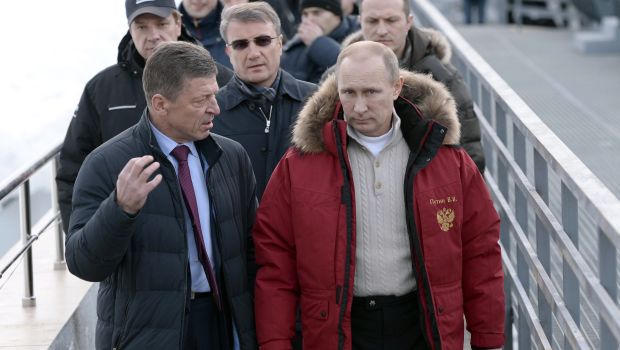
Russian President Vladimir Putin (R), Sberbank President German Gref (C) and Deputy Prime Minister Dmitry Kosak visit an Olympic venue near Sochi on January 3, 2014. (REUTERS/Alexei Nikolskiy/RIA Novosti/Kremlin)
Moscow, Reuters—President Vladimir Putin has eased restrictions on demonstrations in the Black Sea Winter Olympics venue of Sochi, his latest bid to burnish Russia’s image ahead of the Games.
Campaign groups had complained that a ban on rallies imposed as part of a security crackdown violated the constitution.
Putin amended his security decree on Friday to let groups hold marches and gatherings in areas and along routes approved the security services.
“Gatherings, rallies, demonstrations, marches and pickets, which are not directly connected to the Olympic and Paralympic games, could be staged on January 7–March 21, 2014 . . . only after agreement with . . . a local security body,” the Kremlin said on Saturday.
No one was immediately available to comment on the change from human rights organizations.
The restrictions were imposed in August amid security fears that were heightened this week when two suicide bomb attacks killed at least 34 people in the southern city of Volgograd.
No one claimed responsibility for the blasts, but they were a reminder of the continuing threat posed by militants who want to carve an Islamic state out of a swath of southern Russia that includes Sochi.
Putin ordered a further security clamp-down and started a personal inspection of the Olympic sites on Friday.
But there have also been signs he is trying to disarm Russia’s critics ahead of the Olympics, last month freeing several of the country’s best-known prisoners: former oil tycoon Mikhail Khodorkovsky and two members of the female punk group Pussy Riot.
The authorities are hoping to use the Olympics to showcase how Russia has changed since the collapse of Soviet communism in 1991, and the Games’ success or failure will form a big part of Putin’s legacy.
He has closely identified himself with the 50 billion dollar project, ever since flying in person to Guatemala in 2007 to persuade Olympic chiefs to award the event to Sochi.
Rights groups have criticized the treatment of migrant workers, particularly on Olympic sites, and called for greater protection of basic freedoms.
Tens of thousands of peoples took to the streets of Moscow before 2012 elections to protest against what they saw as corruption by the ruling elite.
A December opinion poll showed Putin’s public approval rating fell to its lowest level in more than 13 years against the backdrop of high inflation and a weaker economy.
